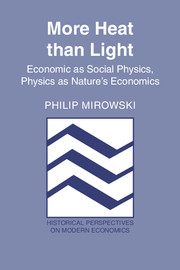Book contents
- Frontmatter
- Contents
- Figures
- Acknowledgments
- 1 The fearful spheres of Pascal and Parmenides
- 2 Everything an economist needs to know about physics but was probably afraid to ask: The history of the energy concept
- 3 Body, motion, and value
- 4 Science and substance theories of value in political economy to 1870
- 5 Neoclassical economic theory: An irresistable field of force meets an immovable object
- 6 The corruption of the field metaphor, and the retrogression to substance theories of value: Neoclassical production theory
- 7 The ironies of physics envy
- 8 Universal history is the story of different intonations given to a handful of metaphors
- Appendix: The mathematics of the Lagrangian and Hamiltonian formalisms
- Notes
- Bibliography
- Index
2 - Everything an economist needs to know about physics but was probably afraid to ask: The history of the energy concept
Published online by Cambridge University Press: 01 June 2011
- Frontmatter
- Contents
- Figures
- Acknowledgments
- 1 The fearful spheres of Pascal and Parmenides
- 2 Everything an economist needs to know about physics but was probably afraid to ask: The history of the energy concept
- 3 Body, motion, and value
- 4 Science and substance theories of value in political economy to 1870
- 5 Neoclassical economic theory: An irresistable field of force meets an immovable object
- 6 The corruption of the field metaphor, and the retrogression to substance theories of value: Neoclassical production theory
- 7 The ironies of physics envy
- 8 Universal history is the story of different intonations given to a handful of metaphors
- Appendix: The mathematics of the Lagrangian and Hamiltonian formalisms
- Notes
- Bibliography
- Index
Summary
The “invariance” character of the theory of the conservation of energy is responsible for the frequent feeling that the theory is incomprehensible, even after it has been explained. We naturally expect an explanation in terms of a substance and its modifications. If we have instead an invariance law and don't realize it, then we keep looking for the substance and do not find it.
[Berkson 1974, p. 136]One who sees the essence of historical development solely in the discovery of fixed scientific truths is badly misled.
[Georg Helm, quoted in Deltete 1983, p. 189]The denizen of the late twentieth century who fills his automobile with gasoline, covers himself with suntan lotion to block out the ultraviolet, turns on his VCR by means of a remote control device and worries about the nuclear power plant just down the river probably feels himself to be quite at home with the concept of energy. Depending upon his education, he may or may not be aware that there are some cryptic mathematical equations behind it all, but on the whole he is content to turn the switches on and off and let someone else worry about the details. I daresay the reader, even if he or she is an economist, more or less falls into this category.
- Type
- Chapter
- Information
- More Heat than LightEconomics as Social Physics, Physics as Nature's Economics, pp. 11 - 98Publisher: Cambridge University PressPrint publication year: 1989

